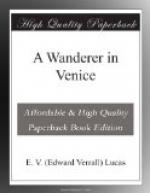Wagner’s impressions of Venice, where, some twenty-four years later, he was to end his anxious and marvellous life, seem to me so interesting that I quote a little more: “There was little else that attracted my attention in the oppressed and degenerate life of the Venetian people, and the only impression I derived from the exquisite ruin of this wonderful city as far as human interest is concerned was that of a watering-place kept up for the benefit of visitors. Strangely enough, it was the thoroughly German element of good military music, to which so much attention is paid in the Austrian army, that brought me into touch with public life in Venice. The conductors in the two Austrian regiments quartered there began playing overtures of mine, Rienzi and Tannhaeuser for instance, and invited me to attend their practices in their barracks. There I also met the whole staff of officers, and was treated by them with great respect. These bands played on alternate evenings amid brilliant illuminations in the middle of the Piazza San Marco, whose acoustic properties for this class of production were really excellent. I was often suddenly startled towards the end of my meal by the sound of my own overtures; then as I sat at the restaurant window giving myself up to impressions of the music, I did not know which dazzled me most, the incomparable Piazza magnificently illuminated and filled with countless numbers of moving people, or the music that seemed to be borne away in rustling glory to the winds. Only one thing was wanting that might certainly have been expected from an Italian audience: the people were gathered round the band in thousands listening most intently, but no two hands ever forgot themselves so far as to applaud, as the least sign of approbation of Austrian military music would have been looked upon as treason to the Italian Fatherland. All public life in Venice also suffered by this extraordinary rift between the general public and the authorities; this was peculiarly apparent in the relations of the population to the Austrian officers, who floated about publicly in Venice like oil on water. The populace, too, behaved with no less reserve, or one might even say hostility, to the clergy, who were for the most part of Italian origin. I saw a procession of clerics in their vestments passing along the Piazza San Marco accompanied by the people with unconcealed derision.
“It was very difficult for Ritter to induce me to interrupt my daily arrangements even to visit a gallery or a church, though, whenever we had to pass through the town, the exceedingly varied architectonic peculiarities and beauties always delighted me afresh. But the frequent gondola trips towards the Lido constituted my chief enjoyment during practically the whole of my stay in Venice. It was more especially on our homeward journeys at sunset that I was always over-powered by unique impressions. During the first part of our stay in the September of that year we saw on one of these occasions the marvellous apparition of the great comet, which at that time was at its highest brilliancy, and was generally said to portend an imminent catastrophe.




